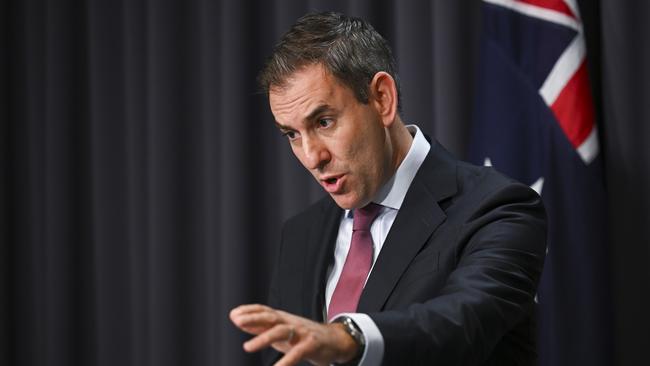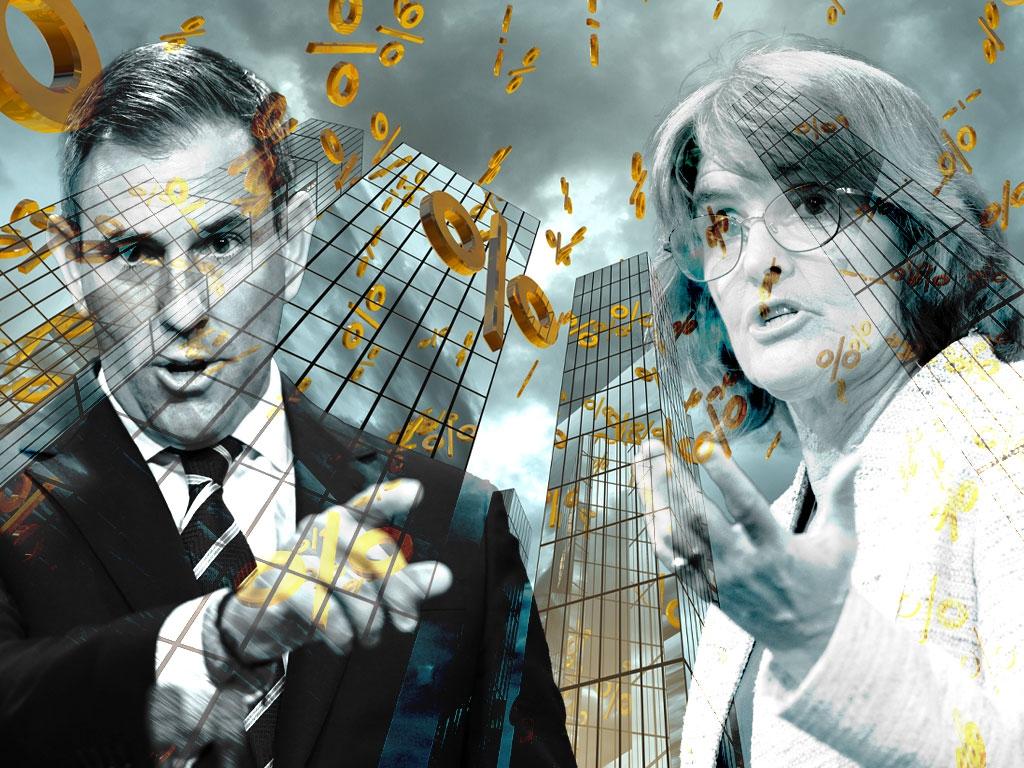Struggling Australians are losing faith in Labor’s economic game plan
As Labor faces voter fury on housing and a squeeze on living standards, time is running out to change course.

In a few weeks, we’ll have reached the midpoint of what Jim Chalmers has described as a “defining decade” for Australia. Are we heading in the right direction? Have we made any progress?
It’s clear during these years of pandemic grind, disrupted supply, price shocks, bigger and activist government, populist fantasy and global “elbows out” assertions of sovereignty, nations such as ours have struggled to find the right post-crisis model for prosperity.
For many countries, the imperative has been to first fight inflation, grab a big piece of the energy transition, begin budget repair and eventually get around to making the economic engine more efficient. And, of course, for incumbents in this year of elections, they’ve walked into the valley of the shadow of death, bearing a rod to flay the other side and a bucket of money to comfort voters.
It has been a political killing zone and Anthony Albanese will be facing two sceptical, if not hostile, constituencies: first, an electorate financially squeezed and losing confidence in the game plan; second, elite opinion, which takes in the business lobby, policy experts and tribal elders who want more ambition from this generation.

The common ground is living standards. The former demand a turnaround, the latter believe they know how to bring it about.
Labor, too, faces a Coalition ascendant, at least in the published polls, pumped up on grievance and government stumbles. While we await costed policies from Peter Dutton, a grown-up platform, there are clues. A handbrake on migration, with the trusty go-slow of visa processing; the nukes chimera that fills a conviction void, conjuring both technology and taxes; and the big swinging stick at the grocery self-checkout.
After a post-budget sulk and Marnus-like sledging from short leg of the Reserve Bank, the Treasurer has re-emerged as the pivotal figure in Labor’s revival. He’s in the weeds and hovering at 30,000 feet, but that’s the life custodian. In an interventionist show, corporatist and flirting with cronyism, picking winners and trying to outdo the market, is the Treasurer transitioning to be the Great Helmsman?
In the past couple of weeks, Chalmers has fronted the foreign policy establishment to talk about decoupling and derisking in the global economy; business economists to extol Labor’s productivity agenda and competition reform; and, to talk about rebuilding trust in politics, the Academy of Social Sciences in Australia, the Chairman’s Lounge for folks who never left uni.
Lest this seem like stalking, or trolling, while the Prime Minister has been clocking up flyer miles and on the flat bed on Albo1, Chalmers has tumbled out a stream of announcements on the revival of National Competition Policy, the future of cash, and more options for retirement savings.
Rounding out the week, he made what could prove to be a seismic shift in where the Future Fund parks our sovereign wealth, by amending its mandate to invest in Labor’s priorities of housing, renewable energy and infrastructure. On Friday he convened a roundtable of chiefs representing $3 trillion in capital (that’s more than our GDP) to nudge them into investments that would create what he has termed the “fourth economy”.
But let’s not skip past the parliamentary set piece of Wednesday’s ministerial statement on the economy. Chalmers laid out Labor’s hits over 900 days in office, with back-to-back budget surpluses and more than a million new jobs the best metrics in show. As he tells it, “even with very substantial progress in the aggregate numbers, we know that doesn’t always translate to how people are faring and feeling day-to-day”.
“We’re not pretending it’s mission accomplished; it isn’t,” Chalmers said. “We are realistic about this, but optimistic, too.”
In July 2022, a few months after being elected, Chalmers shifted to a more sombre tone: the days of “Grim Jim”, as he and Finance Minister Katy Gallagher did a trauma clean of the previous tenants’ fiscal detritus. Inflation was about to get worse, the world economy a more forbidding place, as Labor worked up its first budget in October that year.
Chalmers understands fiscal policy’s role in dampening inflation. Plus he’ll appreciate how supply-side reforms, such as removing red tape, increasing competition, improving education and the take-up of technology, and reducing tax can help by raising efficiency and enabling a bigger economy.
Yet Chalmers hasn’t been able to slow Canberra’s spending on social benefits, possible only because of spectacular growth in income tax that appears to be petering out: a decade of deficits is in prospect. There’s also an off-budget pot that ministerial spendthrifts are eyeing in the run-up to an election.
Federal and state spending has jumped to a record high share of the economy. In today’s money, governments are burning through $120bn more a year. RBA governor Michele Bullock has said public demand is not the “main game” when it comes to inflation; given household spending is stagnant, it’s undeniably pumping dollars into an economy with no spare capacity.
Three budgets down, the mid-year update weeks away, and headline inflation has been temporarily nudged down due to government help to reduce energy bills and rents. But the underlying price pulse worries the RBA’s board. Labor’s nightmare scenario is firming up: no cut in borrowing rates before an election due in May.
As one former senior official told Inquirer, Labor squandered political capital on re-regulation of the labour market to the detriment of productivity. “The rise of the Left in the ALP has seriously hurt them on policy,” the source says.
“Instead of using the first few years of their term to implement supply-side reforms, they became consumed by policy dead ends like Future Made in Australia. The result is that inflation hasn’t come down quickly enough and now it’s killing them.”
The Business Council of Australia raised the alarm this week: the nation is on a “burning platform”. Migration, public spending and high commodity prices have hidden the true extent of our productivity slide. If we don’t address this malaise, “our quality of life stagnates”, BCA chief executive Bran Black wrote in our pages.
Poor policy and a productivity slump collide in the housing crisis. Before Covid, it took an average of seven months to build a new house in NSW, Victoria, South Australia and Western Australia, and five months in Queensland. By June this year, completion times had blown out everywhere: WA (15 months), SA (11 months), NSW (10½ months), Victoria (nine months) and Queensland (eight months). The average cost to build a house in Australia rose by almost 30 per cent across four years to $444,000; in the tradie’s paradise of the ACT it now costs $564,000. In the Sunshine State, where a pre-Olympic big build is in full swing, the average cost of a home increased by 44 per cent.
Across the past decade, construction sector productivity fell by 12 per cent (the average across the “market sector” was a rise of 11 per cent). The big business lobby says restrictive work practices and militant unions are to blame.
“These restrictions add to the cost of construction, slow down much needed home construction and make otherwise beneficial large-scale projects uneconomic,” a new BCA report says. “This triggers a ripple effect of lost output and activity across the economy.”
Add in the population surge and the living cost squeeze, and those ripples are leading to the kind of voter rage and mistrust that have battered incumbents this year in Europe, Asia and the US. The latest True Issues survey of public opinion by JWS Research found a growing number of voters believe the economy is on the wrong track.
JWS Research’s business development manager Tom Cameron tells Inquirer the equivalent “wrong track” pre-election number in the US was 65-70 per cent (compared with 43 per cent here). Polling showed 28 per cent of Americans thought the US economy was on the right track; only 18 per cent of Australians think we’re on the right course.
Cameron says it’s self-evident Australia and the US have different electoral systems and political cultures. “There is plenty of post-game analysis going on in the US right now but some of the wisest and data-driven learning is keeping it pretty simple,” he says. “Two-thirds of Americans felt the economy was on the wrong track and so they showed the incumbent party the exit door.”
Almost four in five voters surveyed by JWS Research see housing as a national crisis and two-thirds want a cut in the migrant intake until more supply eases shortages. “Voters are bothered by where their living standards are today compared to a couple of years ago and they have some clear policy views on how living standards might be improved,” Cameron says.
While inflation persists, Labor has been unable to join the dots or, worse, has flagrantly defied the evidence on our productivity slump, the source of today’s misery of high prices, rising deficits, flighty capital and stagnant living standards. If Chalmers wants to stay at the helm for the second half of the decade, he’ll have to persuade voters Labor can shift to a less risky course.







To join the conversation, please log in. Don't have an account? Register
Join the conversation, you are commenting as Logout